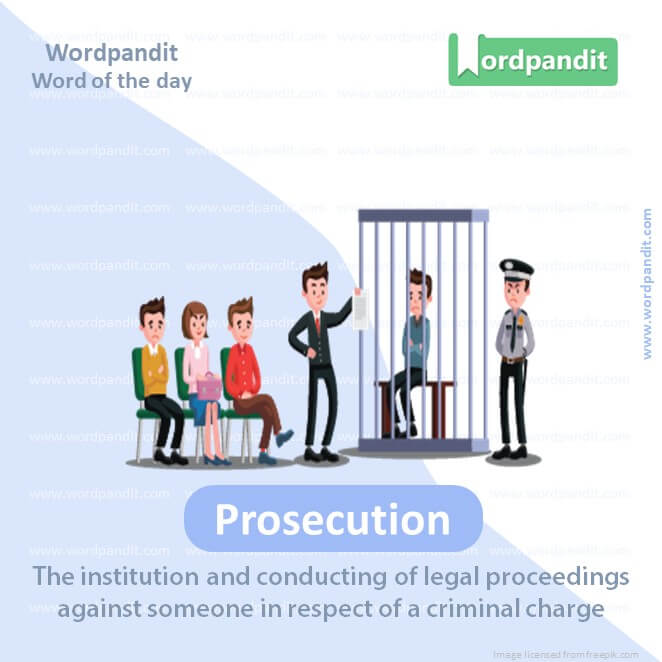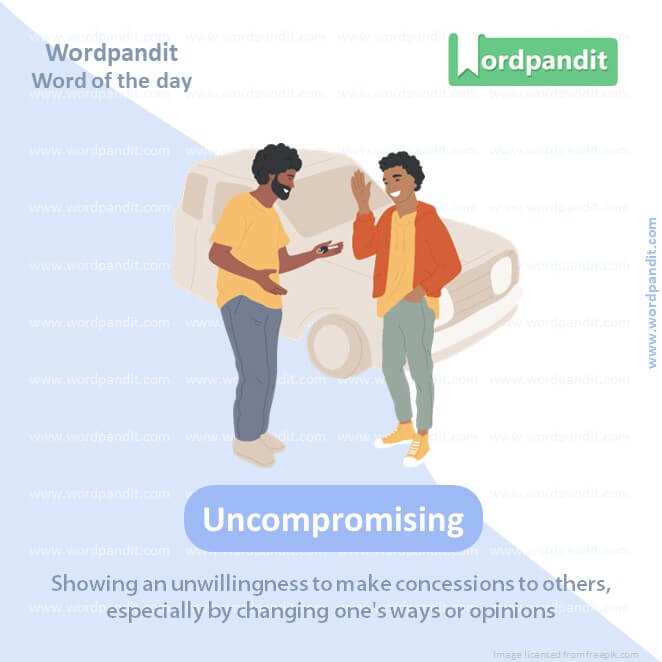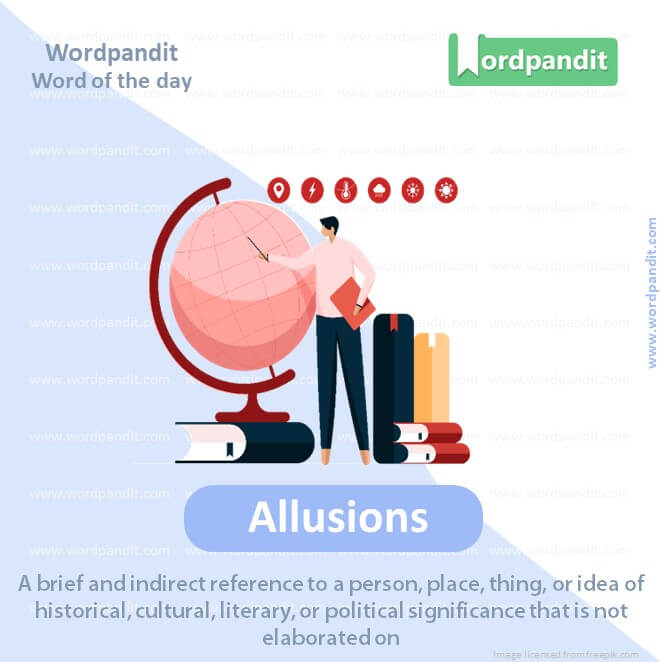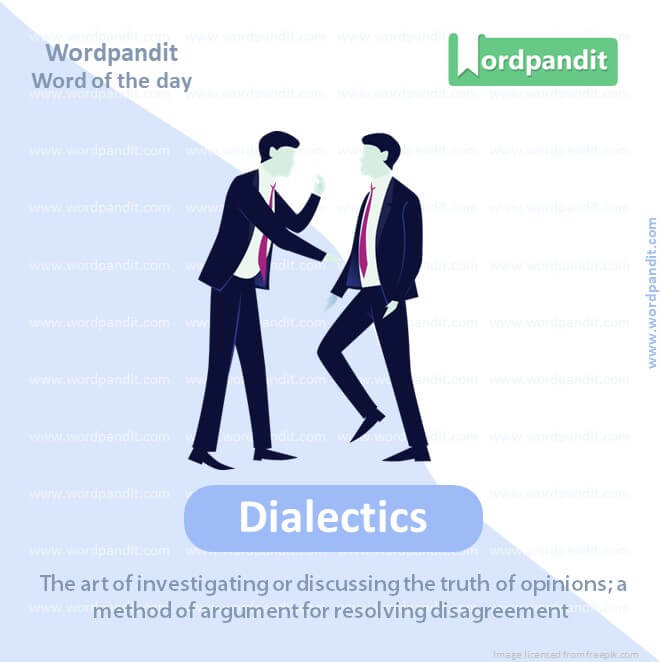Daily Vocabulary Words: List of Daily Used Words
Hi there. Welcome to this special section @ Wordpandit.
Our endeavour here is straightforward: highlighting important daily vocabulary words, you would encounter in The Hindu. This is your repository of commonly used words; essentially, we are posting a list of daily used words. Hence, this has significant practical application as it teaches you words that are commonly used in a leading publication such as The Hindu.
Visit the website daily to learn words from The Hindu.

WORD-1: COALESCED
CONTEXT: Various opposition parties coalesced to form a united front against the proposed legislation.
SOURCE: The Hindu
EXPLANATORY PARAGRAPH: Imagine you have different colors of playdough. If you press two or more of them together, they join and become one big ball of playdough. That’s what “coalesced” means when things come together and become one.
MEANING: Come together to form one mass or whole (verb).
PRONUNCIATION: koh-uh-LEST
SYNONYMS: Merged, united, combined, fused, amalgamated, joined, blended.
USAGE EXAMPLE:
1. The two small rivers coalesced to form a bigger river.
2. Over time, the various tribes coalesced into one large community.
3. The raindrops coalesced on the window pane, making it hard to see outside.
4. Different ideas coalesced to form the final plan.

WORD-2: PROSECUTION
CONTEXT: The prosecution presented compelling evidence in the high-profile corruption case, making it a closely-watched trial across the nation.
SOURCE: The Hindu
EXPLANATORY PARAGRAPH: When someone does something wrong, there are people who try to show everyone how and why they did it. These people work to prove that the wrong thing was done. They are called the “prosecution.”
MEANING: The institution and conducting of legal proceedings against someone in respect of a criminal charge (noun).
PRONUNCIATION: proh-si-KYOO-shun
SYNONYMS: Accusation, litigation, legal action, lawsuit, legal proceedings, indictment.
USAGE EXAMPLE:
1. The prosecution presented their evidence to the judge.
2. The defendant was scared of the upcoming prosecution.
3. The lawyer for the prosecution was very persuasive.
4. After days of trial, the prosecution rested its case.
WORD-3: ALLUDING
CONTEXT: The finance minister, in his speech, made comments alluding to possible major economic reforms in the coming months.
SOURCE: The Hindu
EXPLANATORY PARAGRAPH: Let’s say you have a secret toy and you don’t tell its name, but you give hints about it. That means you’re “alluding” to the toy. It’s like giving small clues without saying it directly.
MEANING: Referring to something indirectly or in a hinting manner (verb).
PRONUNCIATION: uh-LOOD-ing
SYNONYMS: Hinting, suggesting, implying, indicating, mentioning indirectly.
USAGE EXAMPLE:
1. She kept alluding to the surprise without revealing it.
2. I think he was alluding to the time we went to the beach together.
3. Without saying it directly, she was alluding to the mistake I made.
4. Were you alluding to the event last night?

WORD-4: UNCOMPROMISING
CONTEXT: The environmental activist, known for her uncompromising stance on forest conservation, was honored with a national award.
SOURCE: The Hindu
EXPLANATORY PARAGRAPH: Imagine you have a favorite toy and you never ever want to share it, no matter what. That means you’re being “uncompromising” about it. It means you’re standing very firm and not changing your mind.
MEANING: Showing an unwillingness to make concessions to others, especially by changing one’s ways or opinions (adjective).
PRONUNCIATION: uhn-KOM-proh-myz-ing
SYNONYMS: Inflexible, resolute, steadfast, unwavering, unyielding, rigid.
USAGE EXAMPLE:
1. He was uncompromising in his belief about saving the environment.
2. The teacher was uncompromising about the deadline.
3. Her uncompromising attitude was admired by many.
4. Even under pressure, he remained uncompromising.
WORD-5: LOCALISM
CONTEXT: The recent trend toward localism has empowered rural artisans, spotlighting the importance of indigenous craftsmanship.
SOURCE: The Hindu
EXPLANATORY PARAGRAPH: You know how everyone in your town might have a special way of saying or doing things? That’s a “localism.” It’s something special or unique to a place or group of people.
MEANING: A custom, manner of speech, or characteristic of a local area (noun).
PRONUNCIATION: LOH-kuh-liz-um
SYNONYMS: Regionalism, provincialism, dialect, idiom, vernacular.
USAGE EXAMPLE:
1. The way they celebrate the festival is a localism of our village.
2. Using that particular word is a localism specific to people from the south.
3. Tourists are often curious about the localisms of the places they visit.
4. The artist wanted to capture the various localisms of the city.

WORD-6: ALLUSIONS
CONTEXT: The poet’s recent work is filled with allusions to classical mythology, reflecting a deep engagement with traditional lore.
SOURCE: The Hindu
EXPLANATORY PARAGRAPH: Remember when we talked about giving hints without saying something directly? Those little hints or clues are called “allusions.” It’s like talking about something without really naming it.
MEANING: A brief and indirect reference to a person, place, thing, or idea of historical, cultural, literary, or political significance that is not elaborated on (noun).
PRONUNCIATION: uh-LOO-zhuns
SYNONYMS: Hints, implications, insinuations, suggestions, innuendos.
USAGE EXAMPLE:
1. The book was filled with allusions to Greek mythology.
2. The movie had several allusions to popular culture.
3. Without stating directly, she made allusions to their past adventures.
4. The poem uses allusions to express complex emotions.
WORD-7: REPOSITORY
CONTEXT: The local museum serves as a repository for the town’s history, housing artifacts, documents, and photographs that date back centuries. Researchers and historians frequently visit this treasure trove to gain insight into the region’s past.
SOURCE: Hindu
EXPLANATORY PARAGRAPH: Think of a special box where you keep all your toys. That box is a “repository” for your toys. It’s a safe place where you store things.
MEANING: A place where things are stored or kept (noun).
PRONUNCIATION: reh-POZ-it-or-ee
SYNONYMS: Storage, storehouse, depository, archive, vault, warehouse.
USAGE EXAMPLE:
1. The museum is a repository of ancient artifacts.
2. The library acts as a repository for thousands of books.
3. I keep all my photographs in a digital repository.
4. The safe was the repository for all the family’s important documents.

WORD-8:DIALECTICS
CONTEXT: The seminar on philosophy delved deep into the dialectics of Eastern and Western thought, offering a fresh perspective on age-old debates.
SOURCE: The Hindu
EXPLANATORY PARAGRAPH: Imagine two of your toys talking and sharing different ideas. They talk back and forth, learning from each other. “Dialectics” is like that it’s when two different ideas talk to each other and create something new.
MEANING: The art of investigating or discussing the truth of opinions; a method of argument for resolving disagreement (noun).
PRONUNCIATION: dye-uh-LEK-tiks
SYNONYMS: Debate, discourse, discussion, dialogue, reasoning.
USAGE EXAMPLE:
1. The dialectics of the philosophers were challenging to understand.
2. Through dialectics, they arrived at a deeper understanding.
3. He was well-versed in Marxist dialectics.
4. Dialectics play an essential role in academic discussions.
WORD-9:MARGINALISED
CONTEXT: NGOs and activists have consistently highlighted the need to uplift the marginalised communities, urging the government to prioritize their welfare.
SOURCE: The Hindu
EXPLANATORY PARAGRAPH: Imagine there’s a game, and some kids are not allowed to play or are kept to the side. Those kids who are kept to the side are “marginalised.” It means they aren’t treated as important or are left out.
MEANING: Made to feel as if one is not important or not part of the main group (verb).
PRONUNCIATION: MAHR-juh-nuh-lized
SYNONYMS: Sidelined, isolated, ostracized, neglected, overlooked.
USAGE EXAMPLE:
1. The elderly often feel marginalised in our fast-paced society.
2. Marginalised communities need to be given a voice and representation.
3. Many artists tackle the theme of the marginalised in their work.
4. The reforms aimed to uplift the marginalised sectors of the population.
WORD-10:DIM
CONTEXT: With the city’s power grid failing multiple times this month, prospects for a stable summer season appear dim.
SOURCE: The Hindu
EXPLANATORY PARAGRAPH: Have you ever tried to read a book in a room that’s almost dark? When the light isn’t very bright, we say it’s “dim.” It’s like when things are not very clear or bright.
MEANING: Not bright or clear; faint (adjective).
PRONUNCIATION: DIM
SYNONYMS: Dull, faint, shadowy, gloomy, murky, darkened.
USAGE EXAMPLE:
1. I could hardly see in the dim light of the room.
2. As the evening approached, the room became dim.
3. The old lantern cast a dim glow in the hallway.
4. Her memories of that day are now dim and vague.











